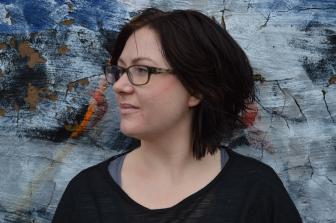Dichter
Melissa Lee-Houghton

Melissa Lee-Houghton
(Verenigd Koninkrijk, 1982)
© Melissa Lee-Houghton. Photo: Steven Houghton
Biografie
Melissa Lee-Houghton is at the forefront of a new strand of confessional poetry in the UK. Her writing is intense and authentic, tackling trauma and taboos. With total emotional investment, she evokes loss, love, grief, hope, abuse, sex, mental illness and survival in artful poems which communicate without losing raw power. Her work is both personal and political; an act of defiance in the face of shame and shaming, silence and silencing. Her significance was recognised in 2014 when she was named as a Next Generation Poet by the Poetry Book Society. In 2016 her poem ‘I am very precious’ was shortlisted for the Forward Prize for Best Single Poem. In the same year, her collection Sunshine was shortlisted for the Costa Poetry Award, and she received a Northern Writers’ Award for her fiction. She lives in Blackburn, LancashirePatterns of Mourning (Chipamunka Publishing, 2009) was produced directly from notes made in a period of institutionalisation. The fragmentary sequence is haunted by grief, but also by literary and philosophical echoes, notably T.S. Eliot’s The Waste Land. Full of unexpected jumps, puns and double-meanings, it gives us a first glance of Lee-Houghton’s characteristic deep intellect and dark humour, as in ‘Telekin-Isis’:
You should consider this is postmodernist literature;
Entirely dysfunctional families such as these
Can only begin to multiply
Through the beams and conversational pitches
If you get the yolk
Entirely dysfunctional families such as these
Can only begin to multiply
Through the beams and conversational pitches
If you get the yolk
Her first full collection, A Body Made of You (Penned in the Margins, 2011) is also influenced by the author’s experiences as a patient in a psychiatric hospital, although here the approach feels more formal. Lee-Houghton creates intimate portraits of ‘other writers, artists, strangers, lovers and friends’, working from initial one-on-one interviews and then photographs and paintings of, or by, the individuals. Mental illness and trauma are central. There is variety in tone, but the description is unflinchingly vivid:
your foreign bread smell
boiled bagels shoulders
round like potato, oily
inner fish skin sweet yeast
boiled bagels shoulders
round like potato, oily
inner fish skin sweet yeast
(‘laid out’)
Such descriptions illustrate a cloying intimacy and these poems make no pretence of objectivity. Links between the protagonists in individual poems emerge as the book progresses, revealing an overarching personal narrative.
The poems in Beautiful Girls (Penned in the Margins, 2013) mark yet another approach. The subjects are, again, traumatic – suicide, mental illness, rape – and Lee-Houghton’s language keeps its blunt edge, but the effects are less fragmentary, more ‘finished’. Here her music is at its most spare, stripped back like the skeletons of the girls in the title poem:
… We’re
lovely in the mud
that fit boys have dug
for a council wage
lovely in the mud
that fit boys have dug
for a council wage
Again, a personal narrative threads the individual poems together, but these events have already happened and equally will never happen; time is flattened and folded and elegies occur before living encounters. The gaze is personal and the description is coloured through the perspective, with the choice of imagery often only understood through later poems:
I can see colours in the back of my eyes
the world is the colour of pig’s liver –
there’s a sheen over everything
as though something violent just happened …
(‘In My Sleep I Try To Wake You’)
The poetic constraints offer a relief to the passages of breathlessness, but it is perhaps in the longer poems – where this restraint is cast off – that Lee-Houghton is at her most powerfully unique.
In 2016 one such long poem ‘i am very precious’, was featured in Prac Crit and became the first poem published online to be shortlisted for the Forward Prize for Best Single Poem. It is a sustained meditation at a high pitch, a virtuoso performance of desiring and being desired in all its beautiful and abject forms. ‘i am very precious’ became the central poem in Sunshine, Lee-Houghton’s latest collection, which has been shortlisted for the Costa Poetry Award. In an interview with Poetry Spotlight she said that she felt ‘finally able to write significantly and unguardedly about violence, rape and childhood abuse, and … able to write about female sexuality in a way which felt completely real.’ She explained that she ‘wrote Beautiful Girls as a heavily sedated person. I always felt I wrote what I needed to at that time with as much lucidity and clarity as I had at my disposal, but it was constrained by many forms of repression and oppression.’ Liberated, Lee-Houghton has embraced the less polished and adopted longer lines and longer poems to create a book which is an unapologetic, immersive experience. The opening poem ‘And All The Things That We Do I Could Face Today’ makes a statement of intention:
… this book is gonna be a killer. It’s gonna suck me dry,
suck me white, such my insides out and leave me hollow and high.
suck me white, such my insides out and leave me hollow and high.
The challenge to a polite readership is constant: ‘You know, the person I am writing this to, the publisher who won’t want to take this poem, I have swallowed a lot of come’ (‘Elm Street’).
The sunshine of the title, which we might associate with healing and warmth, plays a far more complex role. It often exposes, with agonising clarity: ‘My sun-god, pain, illuminates all the damage and the rot’ (‘Cobra). But even in the same poem it shows it is untrustworthy: ‘Even if you are a rotten snake / tulips can look lovely in a certain light.’
In ‘Letter to Dr. Moosa Regarding My Inconstant Heart’ Lee-Houghton sheds light on the treatment of patients by medical practitioners:
you say,
this is the worst state a person can be in, a mixed state, see (like I’m
not in the room) she suffers…
you need to remind the ward to section her as soon as she’s there,
you know,
she’s very persuasive with
junior doctors.
this is the worst state a person can be in, a mixed state, see (like I’m
not in the room) she suffers…
you need to remind the ward to section her as soon as she’s there,
you know,
she’s very persuasive with
junior doctors.
We are reminded in those last words that language can be used to manipulate. Lee-Houghton is an artist and, though she is generous in the access she allows us to her life, poetry is a construction, and we cannot know the author as we might feel we do. This is poetry that is authentic, without pretending to be able to replicate reality.
Every Lee-Houghton poem is a precarious balancing act at the extremes of human experience; a coherent communication of a sense of incoherence; a controlled expression of lost control. There is an urgency and necessity to her work: ‘Writing poetry for me is a vocation. Without it, I wouldn’t cope, wouldn’t survive.’
Lee-Houghton is also a successful prose writer. ‘Inertia’, a short story, was commissioned for Radio 4 and broadcast in June 2016, and a memoir is forthcoming with Rogers, Coleridge and White Literary Agency.
© Emily Hasler for The Poetry Society
PoetrySunshine. Penned in the Margins, London, 2016
Beautiful Girls. Penned in the Margins, London 2013
A Body Made of You. Penned in the Margins, London, 2011
Patterns of Mourning. Chipmunka Publishing, 2009
In Anthology
The Forward Prize Anthology 2016, 2016
The Poet's Quest For God. Ed. Fr. Oliver Brennan and Todd Swift with Kelly Davio and Cate Myddleton-Evans. Eyewear, London, 2016
Best British Poetry 2015. Ed. Emily Berry. Salt, Cromer, 2015
Marginalia. Ed. Tom Chivers. Penned in the Margins, London, 2014
Links
Lee-Houghton’s blog
Sunshine at Penned in the Margins
Lee-Houghton’s profile on the Forward Prizes website
Poem, essay and interview on Prac Crit
Lee-Houghton’s British Council profile
Lee-Houghton’s profile as a Next Generation Poet
An interview with Poetry Spotlight
Gedichten
Gedichten van Melissa Lee-Houghton
Sponsors





Partners
LantarenVenster – Verhalenhuis Belvédère

